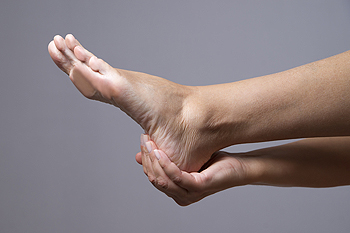
 If you notice a small thickened area in the heel or bottom of your foot producing severe pain and discomfort, you may have what is referred to as a verruca wart, which is more commonly known as a plantar wart. It is caused by the human papillomavirus (HPV), and will typically attack the skin on the bottom of the feet. It typically lives and thrives in moist and warm environments which may include public pools and surrounding areas, shower room floors and locker rooms. It is known to enter the body through tiny cracks in the skin and grows into the heel as a result of pressure the foot endures while walking. Many people may notice a small and callused area where the wart has formed, and small black dots may be present in the center. If you have developed a plantar wart, please speak to a podiatrist who can properly treat this condition.
If you notice a small thickened area in the heel or bottom of your foot producing severe pain and discomfort, you may have what is referred to as a verruca wart, which is more commonly known as a plantar wart. It is caused by the human papillomavirus (HPV), and will typically attack the skin on the bottom of the feet. It typically lives and thrives in moist and warm environments which may include public pools and surrounding areas, shower room floors and locker rooms. It is known to enter the body through tiny cracks in the skin and grows into the heel as a result of pressure the foot endures while walking. Many people may notice a small and callused area where the wart has formed, and small black dots may be present in the center. If you have developed a plantar wart, please speak to a podiatrist who can properly treat this condition.
Plantar warts can be very uncomfortable. If you need your feet checked, contact Dr. Harris L. Klear from Burlington County Podiatry Associates. Our doctor will assist you with all of your foot and ankle needs.
About Plantar Warts
Plantar warts are the result of HPV, or human papillomavirus, getting into open wounds on the feet. They are mostly found on the heels or balls of the feet.
While plantar warts are generally harmless, those experiencing excessive pain or those suffering from diabetes or a compromised immune system require immediate medical care. Plantar warts are easily diagnosed, usually through scraping off a bit of rough skin or by getting a biopsy.
Symptoms
Treatment
To help prevent developing plantar warts, avoid walking barefoot over abrasive surfaces that can cause cuts or wounds for HPV to get into. Avoiding direct contact with other warts, as well as not picking or rubbing existing warts, can help prevent the further spread of plantar warts. However, if you think you have developed plantar warts, speak to your podiatrist. He or she can diagnose the warts on your feet and recommend the appropriate treatment options.
If you have any questions please feel free to contact one of our offices located in Marlton and Delran, NJ. We offer the newest diagnostic and treatment technologies for all your foot and ankle needs.
Read more about All About Plantar Warts